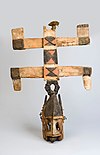Otuho people
Background[1]
The Lotuka have no traditions of an extraneous origin. Iliu, according to Lotuka’s tradition, near the south end of the Lopit Mountains was their original home. However, the lack of water drove the Lotuka to Imatari, and to near Logurun, where, a Chief called Ngalamitiko, who figures largely in their lore, ruled over them. When Ngalamitiko grew old, the people wished to replace him by his son Loghurak.
Loghurak requested them to wait till he was dead but they refused insisting that he should abdicate in favour of his son – a rebellion by the younger generation. He, therefore, sent ‘his dog’ with a message to the Chief of the Akara , urging him to destroy Imatari. The Akara, who came with a vast army only after his death, destroyed Imatari, and slaughtered the Lotuka .
The survivors fled in different directions and settled more or less in the places they now occupy between the Lopit and Dongotono Mountains, Torit, east bank Equatoria. The Lotuka history is that of internecine warfare among its different clans punctuated by combined raids by these clans on the Boya, Imatong, etc.
This article has multiple issues. Please help improve it or discuss these issues on the talk page. (Learn how and when to remove these template messages)
|
The Otuho people, also known as the Lotuko, are a Nilotic ethnic group whose traditional home is the Eastern Equatoria state of South Sudan. They speak the Otuho language.
| Total population | |
|---|---|
| 500,000–700,000[2] | |
| Regions with significant populations | |
| Languages | |
| Lotuko, English | |
| Religion | |
| Christianity, Traditional African religion | |
| Related ethnic groups | |
| Other Nilotic peoples |
Demographics[edit]
The Otuho are bordered by the Lopit in the North, the Bari on the West, the Acholi and the Madi in the South west, and the Didinga and the Boya in the East.[citation needed] Their region is characterized by ranges and mountain spurs such as the Imotong mountain, the highest mountain in South Sudan with an altitude of 10,453 ft above sea level.
[3]The Lotuka live in settlements. There are sixteen known such villages of which Iliu, Hiyala, Lobira, etc. are the most important in terms of their population dominance. The Lotuka number approximately sixty nine to seventy thousands according to the 1983 population census crowded in the sixteen villages and Torit town.
Subsistence[edit]
They engage in some subsistence agriculture; their main crops are sorghum, ground nuts, simsim (sesame), and maize in the plains, or telebun, dukhn, sweet potatoes, and tobacco in the hills.[4]
Land is owned by no single person, but in trust by the community. In the mountains, after finding a site, the group decides the boundaries of each person's garden, with certain areas being fallow (for up to 10 years) and others open to cultivation (for up to 4 years).[citation needed]
| Part of a series on |
| Traditional African religions |
|---|
 |
Religion[edit]
Their primary religion is an ethnic religion based on nature and ancestor worship that is deeply rooted in their ethnic identity; conversion to another religion essentially equates to cultural assimilation. The chief god of the Otuho is called Ajok; he is generally seen as kind and benevolent, but can be angered.[5][failed verification] In Otuho mythology he once answered a woman's prayer for the resurrection of her son. Her husband, however, was angry and re-killed the child. Ajok was annoyed by his actions and swore never to resurrect any Otuho again, and in this manner, death was said to have become permanent.
References[edit]
- ^ "AFRICA | 101 Last Tribes - Lotuko people". www.101lasttribes.com. Retrieved 2024-05-18.
- ^ "AFRICA | 101 Last Tribes - Lotuko people".
- ^ "AFRICA | 101 Last Tribes - Lotuko people". www.101lasttribes.com. Retrieved 2024-05-18.
- ^ "Lotuko (Otuho)". gurtong.net. Retrieved 3 Jan 2018. [dead link]
- ^ Lynch, Patricia Ann (2004). African Mythology A to Z. Facts on File. ISBN 9780816048922.
External links[edit]
- Lotuka (Otuho) people on Gurtong.net
- ^ Project, Joshua. "Lotuho, Latuka in South Sudan". joshuaproject.net. Retrieved 2024-05-18.

